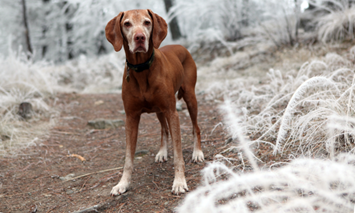Dogs are one of the most popular pets worldwide. They are faithful and loving companions who become part of the family. However, how long does a dog live? This is a question that many dog owners ask. In this article, we’ll explore dogs’ life expectancy and the factors that can affect their longevity.
The average hope of dogs

The average life expectancy of a dog varies depending on the breed and size. According to the American Veterinary Hospital Association, small dogs (less than 20 pounds) live an average of 12 to 14 years. Consequently, medium-sized dogs (between 20 and 50 pounds) live an average of 10 to 13 years, while large dogs (over 50 pounds) live an average of 8 to 10 years. Of course, these are just averages and there are many individual variations.
Factors that affect how long a dog lives, “the longevity of dogs”

Of course, breed and size are the most important factors in the life expectancy of dogs, there are other factors that can also influence the longevity of your pet. Here are some of the most important:
Nutrition: Food is an important part of your dog’s health. A balanced and nutritious diet can help keep your dog healthy and happy. Make sure you provide your dog with an adequate and quality diet.
Exercise: Dogs need regular exercise to stay healthy. Exercise helps maintain a healthy weight, strengthens muscles, and improves cardiovascular health. Make sure you give your dog enough exercise each day.
Dental care: Dental health is important to your dog’s overall health. Regular brushing and visits to the vet for dental cleanings can help prevent dental problems and keep your dog healthy.
Genetics: Certainly, it is an aspect that influences the time a dog lives. Some breeds are more prone to certain diseases and health conditions that can reduce their life expectancy.
Access to veterinary care: Access to quality veterinary care is important to your dog’s health. Regular visits to the vet can probably help prevent and treat diseases before they become major problems.
Care to maximize longevity, and increase the time a dog lives

Therefore, if you want your dog to live a long and healthy life, it is important to provide him with the proper care. Here are some tips to help maximize your dog’s longevity:
First of all, an adequate and quality diet: Make sure you provide your dog with a balanced and nutritious diet. Consult your veterinarian if you have doubts about the best diet for your dog.
Provide enough exercise: Dogs need regular exercise to stay healthy, so be sure to give your dog enough exercise each day, depending on his size, breed and activity level.
Maintain his hygiene and dental health: Brush your dog’s teeth regularly and take him to the vet for regular dental cleanings. Also, be sure to keep your dog clean and bathed regularly.
Schedule regular vet visits: Regular vet visits are important for your dog’s health. Your veterinarian can detect and treat diseases before they become major problems.
Keep your environment safe: Make sure your home and the area around your home are safe for your dog. Remove dangerous objects and make sure your dog doesn’t have access to toxic substances.
Provide love and attention: Dogs need love and attention to be happy and healthy. Provide your dog with plenty of love, time, and attention on a daily basis.
How to manage your dog’s aging?

As dogs age, it’s important to adjust their care to meet their changing needs. Here are some tips for managing your dog’s aging:
Schedule regular vet visits: Regular vet visits are especially important as your dog ages. Your veterinarian can detect and treat health problems before they become major problems.
Adjust their diet: As dogs age, they may need a different diet. Consult with your veterinarian about the best diet for your senior dog.
Adjust their activity level: As dogs age, they may need less exercise or a lower-impact activity. Similarly, adjust your dog’s activity level to meet his changing needs.
Facilitates comforts: As dogs age, they may need additional comforts, such as a comfortable, supportive bed, to help relieve tension in their joints.
Provide love and attention: Older dogs need love and attention just as much as younger dogs, therefore provide your older dog with plenty of love, time, and attention.
Conclusion
In conclusion, the length of time a dog lives can vary depending on breed, size, and other factors. Providing proper and quality food, sufficient exercise, regular veterinary care, and love and attention are some of the best ways to maximize your dog’s longevity. As dogs age, it’s important to adjust their care to meet their changing needs. By providing proper care, you can help ensure your dog lives a long and healthy life.
